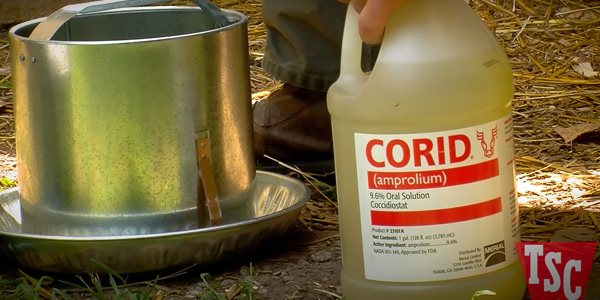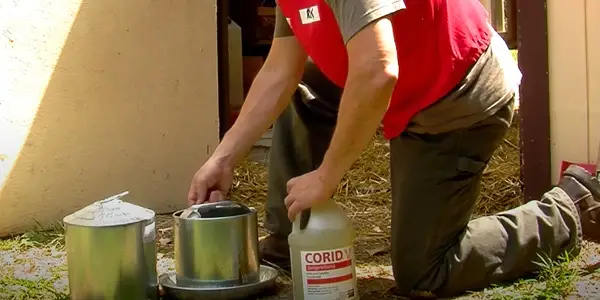It’s quite tragic when your chickens get affected by harmful diseases. Moreover, a disease like coccidiosis can spread out to non-affected chickens easily. So, using something like corid can solve the issue.
However, what if you use too much of that solution! You might be scratching your head after you’ve done that. So, now there’s only one question on your mind.
“Can you overdose chickens on corid?”
If your dosage is not extremely high, you won’t need to worry about corid overdose. The optimal dosage of corid is around 2 teaspoons per gallon of water. Or you can use 10 ml per gallon. The toxic level of corid is pretty high for chickens. However, there may be some side effects.
If you are concerned with corid, it’s better to know more about it. So, let’s dig deep into some facts and the treatment process of this medication.
Some Basic Things About Amprolium
Do you know what the interesting thing is? Although people may use corid frequently, Amprolium is the actual medical term. But that’s not all. There is still a lot more to clarify before I answer your question.
Amprolium is commonly used in the USA as Amprovine, Anticoccid, Corid, and so on. They are from different brands which serve the same purpose of solving coccidiosis. Apart from that, the medication is available in both powder and liquid form.
Now, you might be wondering if there are any side effects of this medicine? To answer your question, you need to understand corid first. Corid is actually a mimicking supplement for Thiamine (Vitamin B1).
So, when your chickens are on corid, you should not use Vitamin B1 on them. If you mistakenly do, there will be consequences for your chickens!
That was only the basics about amprolium or corid. It’s not near what you need to know before you start administering it to them. If you are someone who adores your pet chickens, you might want to read further.
What Does Corid Treat in Chickens?

I think you probably know the purpose of corid or amprolium. These medications mainly work against coccidial infections and prevent them from growing. Corid does not have any withdrawal period. That’s why you can administer it flexibly.
However, it’s always best to understand the medicines before you actually use them. Corid is generally advised not to use it so frequently. Why? Because your chickens might suffer from thiamine deficiency.
When you begin applying corid on your girls, be careful about the dosage. Try to follow the instructions that come with the medication. Or you can also contact your vet to clear out any confusion.
Otherwise, your chickens might get terribly ill because of your mistake.
Now, don’t get too worried about corid dosage for chickens. Because in the next segment, you’ll learn if it’s possible to have a corid overdose.
Can You Overdose Your Chickens with Corid?

As I mentioned in the very beginning, it’s rare to overdose your chickens with corid. Because the corid toxic level is actually way higher than any other medications. So, corid or amprolium dosage for chickens is tough to get wrong.
But there’s a catch! You can’t just administer the wrong dosage and expect your chickens will be fine! So, now, you might wonder, “how much corid for chickens is the right amount?”.
Before I answer that, I want to suggest one thing. You should always talk to a professional before administering any kind of medicine. Especially when you’re dealing with those cute little birds!
Now, have a look at this corid dosage chart-
| Treatment | 20% Soluble Powder | 9.6% Liquid Oral Solution |
| First 3 to 5 days | 1.5 teaspoons/gallon | 2 teaspoons/gallon |
| Next 1-2 Weeks | ⅓ teaspoons/gallon | 0.5 teaspoons/gallon |
So, if you are using the powder mixture, you don’t have to use a lot.
On the other hand, corid 9.6 dosage for chickens is a bit extra compared to powder. You need to be careful with this 9.6% oral solution.
Because chickens can be very lethargic to actually drink it. So, carefully observe them if they are having the medicine properly.
Corid Treatment for Chickens
I hope you got your answer on how much liquid corid for chickens. Now, it’s time to get started with the actual treatment. Many make mistakes while administering it. Either they don’t stop halfway or use too much.
Mixing corid for chickens is quite easy. However, the problem arises when the chicks are not drinking the medicine water regularly. It’s best to use good chicken water in this case.
Here are some good products of chicken waterer-
- Harris Farms Poultry Drinker (Check On Amazon)
- RentACoop Automatic Chicken Waterer (Check On Amazon)
However, try to use only corid-treated water. No other water source should be made available for the birds. If you want more clear instructions, I got you covered.
See the below chart to be absolutely clear-
| Percentage of Corid | 20% Soluble Powder | 9.6% Liquid Oral Solution |
| 0.024% | 1.5 teaspoons/gallon | 2 teaspoons/gallon |
| 0.012% | 3/4 teaspoon/ gallon | 1 teaspoon/gallon |
| 0.006% | 1/3 teaspoon/gallon | 1/2 teaspoon/gallon |
That’s the proper way to treat your chickens with corid! If you understand these instructions, you won’t find any difficulties from now on.
Taking Care of Your Chickens
Now that you are aware of all the corid treatment, you are ready. Ready to do what? To kill those harmful cocci inside your chickens. However, it’s also important to know what to do afterward.
After you get them treated, try to be more attentive and observant. If you notice any of the birds acting strange, quickly separate them from the others. And always maintain a proper balance between nutrients and water.
Lastly, keep your chicken coop clean and tidy. That way, the germs, and bacteria will stay out of your chickens’ bodies.
FAQs
Question: Is CORID Successful in Treating Worms in Chickens?
Answer: Corid, amprol, or amprolium are used to treat chickens for coccidiosis. It is quite effective in resolving or curing coccidial infections. The medicine affects the parasites found in the intestines. However, corid is not able to cure any worm infected diseases. So, you can’t use it to treat worms.
Question: How fast Does Corid Work in Curing Chickens?
Answer: There are two methods of using this medication and both are quite effective. The first method is to add the medication to the water supply. However, sometimes the chickens might not drink water frequently. In such cases, there’s an oral solution as well. You can see effects within 24-48 hours.
Question: Is CORID Effective in Treating Coccidiosis?
Answer: Yes, corid or amprolium is very effective in treating coccidiosis. The medication works to stop the coccidia from growing inside the small intestine. So, the corid mainly prevents more damage that can affect the large intestine. You can get corid or amprolium in both powder and liquid form.
Conclusion
I hope now you got your answer on “Can you overdose on corid?”. While corid overdose might not harm your chickens heavily, you should be more careful.
Also, always try to follow the instructions before applying any medications.
With that being said, have a great day with your lovely chickens!
- Can Ducks Eat Mushrooms? [Explained With Facts] - August 17, 2023
- Will Cayenne Pepper Keep Ducks Away? Answered in Detail - August 1, 2023
- Can Geese Eat Bananas? [Properly Answered] - June 27, 2023

